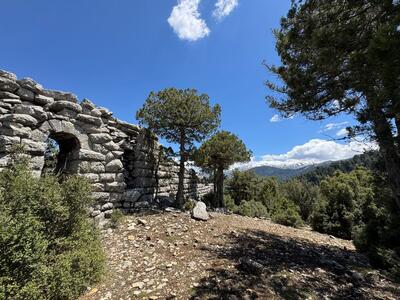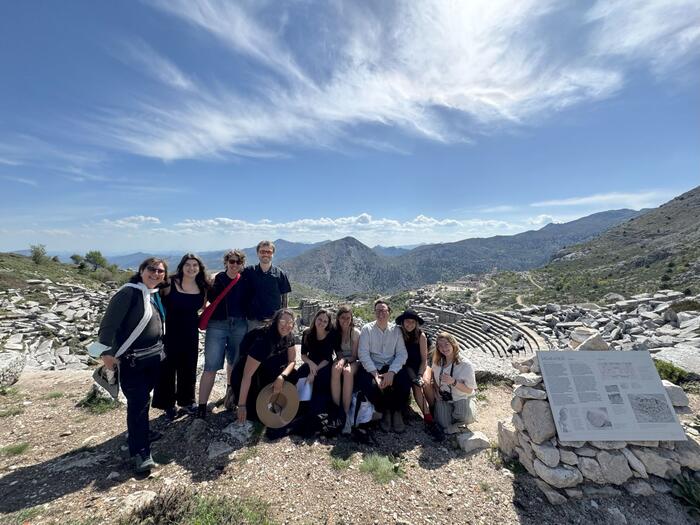By Kim Lawton
For Professor Laura Nasrallah’s spring-seminar course The Archaeology of the Roman Empire for the Study of the New Testament and Early Christianity, Yale doctoral student Helena Martin ’20 M.Div., ’23 S.T.M. conducted an in-depth study of Perge, an ancient city in what is now southern Türkiye (Turkey). Perge is briefly mentioned in the New Testament as the Apostle Paul’s entry point into Asia Minor during his first missionary journey. Martin read scholarly journals, scrutinized archeological excavation reports, watched drone videos, and examined numerous photos. Then, from April 27 to May 7, she visited the Perge ruins in person, with Nasrallah and eight other students on a trip to visit historical sites in Greece and Türkiye.
 Martin says her studies did not fully prepare her for experiencing Perge firsthand. “At one point, I even teared up,” she says. “Being a Ph.D. student, it’s easy to spend all my time in my head. A trip like this is an important reminder that the study of religion cannot stop there.”
Martin says her studies did not fully prepare her for experiencing Perge firsthand. “At one point, I even teared up,” she says. “Being a Ph.D. student, it’s easy to spend all my time in my head. A trip like this is an important reminder that the study of religion cannot stop there.”
That is precisely what Nasrallah hoped her students would gain from the trip, which she describes as an “ethical and intimate encounter with the past.”
“So often in the study of religion, we rely on published literary materials,” Nasrallah says. “This class is really intended to help students—and to help myself—think about the full social, economic, and political life into which what we call religion emerges. Religion is never absent from those very concrete connections.”
A traveling community of learners
Nasrallah, who is Buckingham Professor of New Testament Criticism and Interpretation, has been a member of the YDS faculty since 2019, with joint appointment in the Department of Religious Studies. Previously, she was on the faculty of Harvard Divinity School. For more than 20 years, Nasrallah has taught classes on antiquity that culminate with a trip to visit historic sites. This was her second such trip for Yale. Nine students accompanied her: three doctoral students from three different departments and six YDS students.
The trip started in Greece. Group members met in Athens and then traveled to Corinth and Delphi before flying to Türkiye. There, they visited Perge, Antalya, Myra, Andriake, Oinoanda, and Sagalassos. They focused on places that were associated with prophecy and divination, the topic of Nasrallah’s next research project. The trip was sponsored by the Institute of Sacred Music, the MacMillan Center for International and Area Studies, and Archaia, the Yale Program for the Study of Global Antiquity.
During the semester, each student was asked to research and present a site report on one of the places on the itinerary. “What we’re trying to do is to study issues of ethnicity, race, gender, politics, and political power in the ancient world—and how these intersect with religion and the emergency of Christianity,” Nasrallah says.
 On the trip, the group would typically visit an archeological site in the morning and a museum in the afternoon. Often, they met with local archeologists. On the day they visited Oinoanda, they hiked up a mountain for hours to view Diogenes’ famous inscription, a lengthy account of the Epicurean doctrines from the second century CE. On the night prior to visiting each site, students read their colleagues’ papers. Then, on location, they presented their research and discussed the topics raised.
On the trip, the group would typically visit an archeological site in the morning and a museum in the afternoon. Often, they met with local archeologists. On the day they visited Oinoanda, they hiked up a mountain for hours to view Diogenes’ famous inscription, a lengthy account of the Epicurean doctrines from the second century CE. On the night prior to visiting each site, students read their colleagues’ papers. Then, on location, they presented their research and discussed the topics raised.
“One of the things I love is to watch students pulling each other aside and saying, ‘Look, I saw something that’s relevant to your work,’’’ says Nasrallah. “Certainly, I’m guiding and helping them on the path, but they’re also helping each other. It’s a community of learners. We are together for hours and hours, hiking, on buses, and eating together, really forming and solidifying this community.”
Seeing the deeper narrative
Nasrallah hopes her students learn practical skills such as doing oral presentations and transforming research papers into conference talks or class lessons. But she also hopes they reflect on what they can learn that may depart from the predominant narrative.
“It’s often the stories of enslaved people or those who identified as women or the poor that are less evident,” she says. “We also try to ask the question, what has been lost on this site, because archeology is fundamentally a destructive practice. So, what are the politics of how the site and the museum are displayed to us?”

Many of the places the group visited were associated with the letters of the Apostle Paul, a frequent topic in Nasrallah’s research. Yet, she urges her students to take a broader view. “I’m trying to emphasize the significance of understanding all kinds of different religions, that we can’t understand Christianity or Judaism without understanding the rich, multi-religious context out of which ancient Christianity emerges and within which ancient Jews are also moving,” she asserts.
Nasrallah says her own scholarship is enhanced by the students’ research and questions. “It’s a real collaboration,” she says. “I’m grateful to Yale for having the privilege of going to other countries and interacting with such a diversity of scholars. Learning from all of that is remarkable.”
 Kim Lawton is an award-winning reporter, producer, and writer who has worked in broadcast, print and online media. For nearly 20 years, Lawton was Managing Editor and Correspondent for the highly acclaimed national public television program “Religion & Ethics NewsWeekly.”
Kim Lawton is an award-winning reporter, producer, and writer who has worked in broadcast, print and online media. For nearly 20 years, Lawton was Managing Editor and Correspondent for the highly acclaimed national public television program “Religion & Ethics NewsWeekly.”